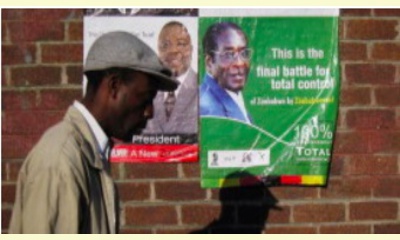|
|
Zimbabwe: Christian denominations launch peace initiative
un article par Winstone Antonio, The Standard, Zimbabwe (reprinted by permission)
The programme is dubbed the Ecumenical Peace Observation
Initiative in Zimbabwe (Epoiz) . 
Photo from Great Indaba
click on photo to enlarge
ZHOCD director, Tendaiwo Maregere told The Standard at Gokwe
Centre last week that the nation had gone through difficult times
which required churches to take an initiative to ensure that peace
prevails.
“With the Epoiz initiative, we seek to strengthen and amplify
churches joint advocacy voices, facilitating stronger coordination of
various efforts for peace while promoting free and peaceful citizen
participation in national processes, particularly elections and
referenda,” Maregere said. “The goal of this initiative is to promote
an enduring culture of peace in Zimbabwe and facilitate national
healing, forgiveness and reconciliation.”
He said the programme would see officials touring seven provinces
in the country to preach the gospel of peace and reconciliation.
“We have selected seven provinces at the moment, among them
Masvingo, Hwange, Mashonaland West, Bulawayo and Midlands. The
selection criteria was based on the conflicts experienced in the
recent past with the need to conscientise such communities to a
climate of tolerance and peaceful co-existence,” Maregere said.
“It is essential that the church initiates the process of healing,
forgiveness, reconciliation and peace building in its endeavour to
develop a culture of peace in Zimbabwe.”
Maregere said the project would incorporate church, traditional and
political parties, government, civil society, business, security sector,
media, congregants and communities.
ZHOCD research and advocacy officer Tendayi Bobo said the
programme has so far received an overwhelming response from
people and other stakeholders. m“We have been in Rusape, Hwange
and Karoi preaching the gospel of peace and people in those areas
embraced the project,” Bobo said. “Our aim is to bring violence
perpetrators and victims under one roof and educate them about
the culture of peace in national processes.”
ZHOCD is a conglomeration of four umbrella church bodies
comprising Evangelical Fellowship of Zimbabwe (EFZ), the
Zimbabwe Catholic Bishops’ Conference (ZCBC), Zimbabwe Council
of Churches (ZCC) and the Union for the Development of Apostolic
and Zionist Churches in Zimbabwe (Udaciza) as associate members
of ZHOCD that was launched last year.
|








|
DISCUSSION
Question(s) liée(s) à cet article:
How should elections be organiized in a true democracy?,
* * * * *
Commentaire le plus récent:
CPNN receives more and more articles from Africa about initiatives that contest the European model of "winner-takes-all" elections, and demand that elections should only be part of a broader democratic process that seeks consensus and compromise.
This fits with the pre-colonial systems of justice in Africa, when there was no monotheism and no single supreme god, no single supreme law, no single "truth" provided by divine intervention, but rather a compromise among many different "gods," perspectives and "truths" arrived at through a process of mediation, for example, the "palabra."

|
|









